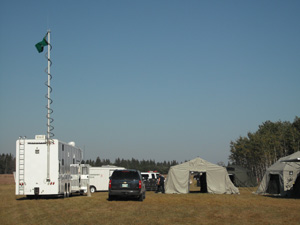
Search and Rescue Command Centre.
What could be better than enjoying a great Manitoba day outside, going fishing, boating, snowmobiling, off-roading or hiking in the woods?
It doesn’t get much better than that here in Manitoba where outdoor adventures abound. That is unless you take a wrong turn, run out of gas or supplies, or get stranded in a sudden storm.
That’s when you count on your family and friends to realize you’re not back on time and have called the police for help as soon as possible.
Who do I call if someone is lost or missing?
Call your local police, dialing 911 where available.
The RCMP serves most of Manitoba, with the exception of Altona, Brandon, Dakota Ojibway Police Service area, Morden, Rivers, Ste. Anne, Victoria Beach, Winkler and Winnipeg.
RCMP role in search and rescue
Local RCMP work with the community – those who best know the people and terrain. Along with making initial enquiries locally, the RCMP will make further contact with search and rescue services as required.
In northern Manitoba alone, RCMP Detachment members in Shamattawa, Island Lake, Thompson, Oxford House, Lynn Lake, Pukatawagan, Split Lake, Cranberry Portage and Little Grand Rapids were involved in searches last year.
In southern Manitoba, searches involved RCMP Detachments in Waywayseecappo, Gimli, Cross Lake, Dauphin, Stonewall, Lundar, Powerview, Falcon Beach, Lac du Bonnet, Steinbach, Selkirk, St. Pierre, and Neepawa.
By provincial law, the Office of the Fire Commissioner (OFC) provides assistance to the police of jurisdiction for search and rescue missions.
OFC provides a mobile command center to the local police for search coordination and efforts, as well as ground search support, management and logistics.
Your local RCMP may need to contact the RCMP’s Search and Rescue Team who works with:
• the Manitoba Office of the Fire Commissioner,
• Search and Rescue Manitoba (SARMAN),
• Civil Air Search and Rescue Association (CASARA)
• Coast Guard and Coast Guard Auxiliary
• Canadian Forces and Canadian Rangers and
• local Emergency Services (fire and paramedic).
The RCMP Search and Rescue (SAR) team conducts searches for lost persons, as well as searches for evidence in investigations.
RCMP SAR members get extensive training in search and rescue techniques, GPS and compass use, as well as annual training and updating of skills.
When needed, the SAR coordinator may also call in the RCMP Police Dog Service and private helicopters to assist.
Last year RCMP SAR coordinator Sgt. Rod Karpish received 41 calls for assistance. He says the RCMP team was called out to 20 of those incidents: 16 were missing person searches while the other four were evidence searches.
In 12 of the 16 missing person searches, the subject was located alive, either finding their own way or being found through the joint efforts by family, friends, local RCMP and emergency services, RCMP Search and Rescue, OFC, CASARA and the Coast Guard.
In half the calls for assistance, the missing person was located while the RCMP SAR team was being dispatched.
“We treat every call for help as a life-threatening and time-sensitive situation,” says Sgt. Karpish, “So each call means we head out the door as fast as we can.”
In other cases, Sgt. Karpish assisted the local RCMP detachment with search advice and with contacting and coordinating with their partners in rescue services.
“Last year the RCMP SAR team spent 21 days on missing person searches, doing grid searches in dense forest and swamps, lakes and winter roads,” he says.
“So, tell someone where you’re going, and when you’ll be back. Take proper supplies, including GPS, cell phone, water and warm clothing. If lost, “hug a tree”: stay put, build a shelter and wait for rescue.”
RCMP Rescue Stranded Family
In late November Island Lake RCMP received a report at about 10 p.m. of an overdue family traveling by boat. A young family of three, including a one-year-old, had left St. Theresa Point seven hours earlier on their way to Garden Hill.
At the time the Island Lake area was experiencing heavy snowfall, high winds and a sharp drop in temperature. The bands of St Theresa Point, Wasagamack and Garden Hill had begun a search of the lake which continued into the night.
At day break, Island Lake RCMP chartered a helicopter to search the surrounding area. The helicopter located the family at about 9:00 a.m. the following day one mile east of St. Theresa Point.
Due to poor landing conditions, the helicopter pilot was forced to touch down in a very wet, swampy area. An RCMP member leapt from the helicopter into hip-deep ice and water, and assisted the woman and the baby into the helicopter. They were taken to the local nursing station for observation.
The helicopter made a second trip and picked up the man and the RCMP member who had stayed behind. Despite spending a cold night in a swampy area on shore and using the boat fuel for fire, all three were reported in good condition.
How do I volunteer for search and rescue?
In Manitoba the Office of the Fire Commissioner is in charge of training standards and verification. They provide training to interested volunteers.
SARMAN (Search and Rescue Manitoba) is the organization which monitors and ensures all its members are adhering to standards. Due to safety and liability concerns, the RCMP only uses volunteers that meet these standards.
Any person or group can apply and provide their training standards to be verified. If they meet the provincial standard, they become recognized as trained.
What if I don’t meet the training standard?
Untrained volunteers are also helpful in Search and Rescue missions but they must be under the direct supervision of trained subject. They are often used in safe, low probability areas. Civilian Dog Teams may also be used, as long as they comply with established provincial standards.
Today the RCMP Search and Rescue team andthe Manitoba Office of the Fire Commissioner are taking part in a training exercise near Brandon. Members of the media wishing to attend are asked to contact the Media Relations Office and we will coordinate.



